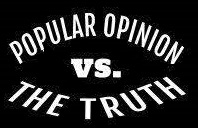Truth Amidst Spectacle
By Anthony Casperson
9-19-20
“I really hate that guy. He’s always so judgmental against the things I do and believe.”
No, this isn’t a quote from a news outlet, cultural blog, or forum post. While it very well could be the summary of a few, this is a paraphrase of a king’s words against a prophet in the bible. It is found in 2 Chronicles 18:7.
Let me set the scene.
Jehoshaphat, king of the Southern Kingdom of Judah, traveled up to his ally (and son’s father-in-law) Ahab, king of the Northern Kingdom of Israel. They wished to discuss some political affairs. One topic of conversation happened to be a discussion about Judah joining Israel in a war against a city named Ramoth-Gilead.
An immediate yes came from Jehoshaphat. But since he remained a (relatively) faithful follower of Yahweh, Jehoshaphat asked Ahab if they could inquire of the Lord how they should go about this endeavor.
Ahab, on the other hand, very much enjoyed the polytheistic tendencies of the peoples of the surrounding nations. (He and his wife, Jezebel, were the primary antagonists in the stories about the prophet Elijah. But we’re talking about a different prophet in the passage mentioned above.) Considered to be the least God-honoring among all of the various kings of Israelite descent, whether Northern Kingdom, Southern Kingdom, or the original union of the two states, Ahab had a rocky relationship with Yahweh, to say the least.
However, in honor of the alliance with his fellow king, the northern king called prophets to speak on behalf of the God of Abraham, Isaac, and Jacob. They made a big event of the whole thing, inviting over 400 people called prophets before the pair of kings. And each, in their own way, agreed with the plan to go to war. They all told King Ahab to do as he pleased. God would bless this desire of the king for war.
But Jehoshaphat could see that none of these prophets spoke like the prophets of Yahweh. The fact that they didn’t use God’s chosen name in his covenant with the people of Israel might have been a tip off. Rather, these prophets spoke in terms that made it sound like they spoke the truth of Yahweh, while they really spoke on behalf of the false gods of the surrounding nations (and their own self-interests).
So, the southern king asked Ahab if there was a real prophet of Yahweh in Israel. And he responded that there was one, but he hated the guy, because he never prophesied good things concerning Ahab. (Read: “The guy always speaks of the things that I think are good as bad, evil, and ungodly.)
And this is where we came in.
The prophet in question, Michaiah son of Imlah, was called before the kings. But the messenger sent to retrieve the prophet informed Michaiah that all of the king’s other prophets had told him what he wanted to hear. It’s implied that it would be a very good idea for Michaiah to bend his prophecy in that direction too, if he knew what was good for him.
Meanwhile, the other prophets had continued to prophesy, even now bringing in God’s name and using elaborate props. One guy wore iron horns, saying that the pair of kings would push the Syrian people like a bull. Their elaborate lie to just placate the cultural elite’s desire continued unabated.
In walked Michaiah. The text doesn’t say it, but I can’t help but think that the prophet of Yahweh rolled his eyes at the spectacle. He walked up to the thrones and spoke, “Go up and triumph. They’ll be given into your hand.”
The words had to have come out in some sort of sarcastic manner, because Ahab heard what he wanted to hear, but pressed the prophet’s words anyway.
Michaiah then laid the truth down before Ahab. Israel would be scattered like sheep without a shepherd. The king would die in the battle.
The northern king looked to Jehoshaphat and said, “See. What did I tell you about this guy? He’s so wrapped up in his own judgmentalism that he’d only speak hate-filled and hurtful words.”
The prophet continued the words of Yahweh. The Lord had sent a spirit to draw Ahab into this battle. Lies from the mouth of these yes-men, these lackey prophets, that would lead Ahab to his demise for his idolatry. It was the will of God for Ahab to take part in this battle, but not for victory. The bell tolled for Ahab.
The king and his prophets mocked Michaiah, punching him and asking which spirit caused them to do that. Basically, “If your God is so in control, why’d he let you get hit, Michaiah?” An action very much like what happened to Jesus centuries later when the Roman soldiers played “pop the prophet” with him, placing a bag over Jesus’ head and asking which one of them hit him.
Ahab then had the prophet imprisoned until he returned safely. The prophet replied that if the king returned, it would prove that Michaiah was no prophet of Yahweh.
The pair of kings went on with their war anyway. Ahab disguised himself as a common soldier, leaving a big target on Jehoshaphat’s royal back. Some ally, huh?
But in the end, a stray arrow struck Ahab, killing him. Michaiah’s prophecy from Yahweh held true.
So, what’s the point of speaking about this story? When I read this passage earlier this week, I couldn’t help but see parallels with our culture. People in power, whether political or cultural, desiring to do things however they see fit, gathering around them others to make their actions sound like a good idea. And anyone who stands up against them, especially when it is on account of the truth of God, is hated, made fun of, and told to just agree with the majority of other people. As if truth was a matter of popular opinion, rather than an objective statement from God.
The passage calls we followers of Yahweh to continue on in speaking the truth. We might be made fun of. We might be hated. We might even end up imprisoned. But we will be found truthful when we remain aligned with God’s word rather than popular opinion.
Continue on my brothers and sisters in Jesus. Speak the truth into the spectacle of lies. We may have to take a hit for the truth, but that just makes us more like our Savior.




